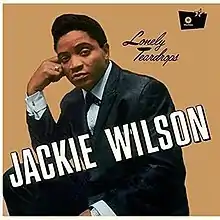Lonely Teardrops
"Lonely Teardrops" is a song written by Berry Gordy Jr., Gwen Gordy and Roquel "Billy" Davis, first recorded and released as a single in 1958 by R&B singer Jackie Wilson[1] on the Brunswick label. It is a 1999 Grammy Hall of Fame Inductee. The recording became an across-the-board national Top 10 Pop smash (# 7), a # 1 hit on the R&B charts, and is ranked #315 on Rolling Stone magazine's list of The 500 Greatest Songs of All Time.[2] It is ranked as the 57th biggest U.S. hit of 1959.[3] "Lonely Teardrops" is also listed on the Rock and Roll Hall of Fame's list of "The 500 Songs that Shaped Rock and Roll".[4]
| "Lonely Teardrops" | ||||
|---|---|---|---|---|
 | ||||
| Single by Jackie Wilson | ||||
| B-side | "In The Blue Of The Evening" | |||
| Released | November 17, 1958 | |||
| Recorded | 1958 | |||
| Genre | Rock and roll | |||
| Length | 2:41 | |||
| Label | Brunswick | |||
| Songwriter(s) | ||||
| Producer(s) | Berry Gordy | |||
| Jackie Wilson singles chronology | ||||
| ||||
Song information
Written by Berry Gordy Jr.,[5] Gwendolyn Gordy (Berry's sister) and Roquel "Billy" Davis, going under the pseudonym Tyran Carlo, the single, alongside Wilson's debuting five consecutive singles between 1957–58, turned Wilson into an R&B superstar and influenced the later careers of Davis, who joined the staff of Chess Records while Gordy used the money from the song's success to form Motown Records within a year. The song raced up to number one on the Billboard R&B chart and became Wilson's first top ten hit on the Billboard Hot 100, eventually peaking at number seven. It was originally intended by Gordy to be recorded as a ballad. After recording it, Wilson and Brunswick executives felt the song lacked something. It was then given to veteran Decca Records arranger Dick Jacobs who re-arranged it into the smash hit it became. The hit's success helped land Wilson on American Bandstand and The Ed Sullivan Show performing to receptive audiences on the respective shows, as well as other shows such as Shindig and Hullabaloo. The music was arranged by the great arranger Belford "Sinky" Hendricks who also arranged for Dinah Washington, Nat King Cole, Sarah Vaughan, Aretha Franklin and many, many other top vocalists.
This was the last song Jackie Wilson performed before his coma and later death, when he collapsed on-stage singing it while appearing as one of the feature acts in Dick Clark's Good Ol' Rock and Roll Revue in 1975.
Cover versions
- The title was covered by the rhythm and blues singer Chuck Jackson in his solo 1961 album I Don't Want to Cry!.
- Jay and the Americans covered the song on their 1970 album, Wax Museum.
- Brian Hyland also recorded a version of the song that reached #54 on the Billboard Hot 100 in 1971.
- In 1975 John Fogerty released a version of it on his solo album John Fogerty.
- The biggest hit cover version was recorded by country music singer Narvel Felts. His version was released in 1976 and reached #5 on the Billboard Hot Country Singles chart that June. He also reached #62 on the Billboard Hot 100.
- In 1983 Jose Feliciano included his cover version his Motown LP Romance in The Night and also played live the song on Motown 25: Yesterday, Today, Forever show
- The Los Angeles hair metal band White Sister recorded a hard rock version of the song on their 1986 album Fashion By Passion.
- R. Stevie Moore covered the song on his 1976 album Returns.
- Johnny Maestro & the Brooklyn Bridge recorded the song for their self-titled 1993 double CD and often sang it in concert.
- Victor Wood covered this song on his 1971 album Mr. Lonely.[6]
- In 2010, Cee Lo Green covered the song on Later... with Jools Holland featuring Holland on piano.[7]
Covers of the song have also appeared in several films: Michael McDonald covered the song in the early 1990s and his version was used in the film Leaving Las Vegas. It was also covered by Howard Huntsberry, who portrayed Wilson, for the 1987 biographical movie about Ritchie Valens, La Bamba, and Huey Lewis's performance of the song in the 2000 karaoke-themed film Duets was also released as part of the film's soundtrack. The jazz fusion/rock guitarist Robby Krieger (The Doors) performs a version of the song on his 1989 solo album, No Habla.
Charts
| Chart (1958–59) | Date | Position |
|---|---|---|
| US Billboard Hot 100 | 9–16 February 1959[8] | 7 |
| US Billboard R&B | March 1959 | 1 |
See also
- Shout (The Isley Brothers song), a call and response answer to the song.
- List of number-one R&B singles of 1958 (U.S.)
References
- Video of the original Jackie Wilson version on Video on YouTube
- "Rolling Stone's 500 Greatest Songs of All Time". Rolling Stone. April 7, 2011. Retrieved October 1, 2015.
- "Top 100 Hits of 1959/Top 100 Songs of 1959". Musicoutfitters.com. Retrieved 2016-08-29.
- "The 660 Songs That Shaped Rock and Roll - Music - Forums". Best Ever Albums. Retrieved 2016-08-29.
- "Show 17 - The Soul Reformation: More on the evolution of rhythm and blues. [Part 3] : UNT Digital Library". Digital.library.unt.edu. Retrieved 2010-09-18.
- David Gonzales. "Mr. Lonely - Victor Wood | Songs, Reviews, Credits". AllMusic. Retrieved 2016-08-29.
- Video on YouTube
- "The Hot 100 Chart - 9 February 1958". Billboard.com. Billboard. Retrieved 31 October 2020.